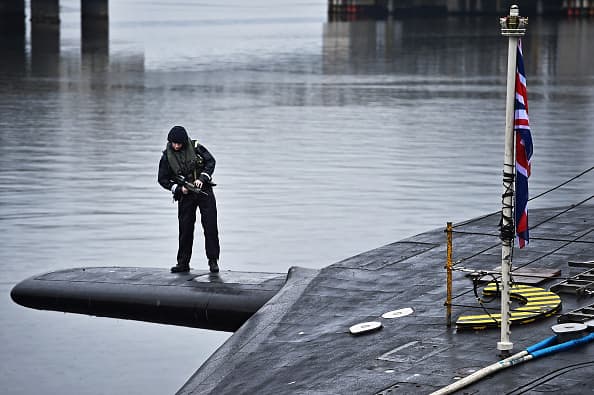Royal Navy security personnel stand guard on the Trident HMS Vigilant submarine in Scotland.
Jeff J Mitchell | Getty Images
LONDON – The UK has changed its defense policy, which could allow the use of nuclear weapons in response to “emerging technologies”.
The country’s 111-page Integrated Defense Assessment, published on Tuesday, included a subtle line about when the UK “reserves the right” to use nuclear weapons.
He says the UK could use nuclear weapons if other countries used “weapons of mass destruction” against him. These weapons include “emerging technologies that could have a comparable impact” to chemical, biological or other nuclear weapons.
Some British newspapers report that “emerging technologies” include cyber attacks, citing members of the defense, but the report does not say so explicitly. The UK government did not immediately respond to a request for comment from CNBC.
Tom Plant, director of the think tank Royal United Services Institute, told CNBC: “I would not interpret this to include cyber attacks in isolation, no.”
He added that “the understanding of what constitutes emerging technology in government is not evenly distributed – cyberspace is definitely not ’emerging’, but it has emerged in a very substantial way”
In any case, Plant believes that the change in language is significant.
“I think it is a marker that there is potential in the future for combinations of technologies and behaviors that come together and create emerging risks – which may not have arisen through the development of any isolated technology – that are incredibly difficult to predict and that there are at least the possibility that one or more of these emerging challenges still unknown may rival the weapons of mass destruction in the threat they represent, “he said.
Trident tactics
The UK’s nuclear program, known as Trident, was established in 1980 and now costs the UK about £ 2 billion ($ 2.8 billion) a year to operate.
The Integrated Defense Review confirmed that the UK is allowing a self-imposed limit on its stockpile of nuclear weapons to rise to 260, abandoning the previous limit of 225 warheads, as well as the current reduction target of 180 in the mid-2020s.
“This reverses the UK’s course of consistent post-Cold War nuclear reductions and runs counter to earlier guarantees that the program to replace the UK’s existing nuclear deterrent system would not increase the number of nuclear warheads in service,” wrote Plant on a blog.
He added that the changes are presented as a reaction to a changed international security environment.
“The government paints a picture of a world with growing international competition and growing threats from Russia, China, North Korea and Iran,” said Plant. “In their judgment, the UK’s opponents are increasing the variety and quantity of their nuclear capabilities and see nuclear weapons as a means of coercion, deterrence and even combat.”
Although the United Kingdom appears to be expanding the scenarios in which it could use nuclear weapons in a viable way, US President Joe Biden said in his election campaign that the “sole purpose” of nuclear weapons should be to stop or retaliate against another nuclear attack.
Indo-peaceful slope
The Integrated Defense Review also outlined a new “slope” towards the Indo-Pacific region.
“In 2030, we will be deeply engaged in the Indo-Pacific as the European partner with the broadest and most integrated presence in support of mutually beneficial trade, security and shared values,” says the document.
The document states that the United Kingdom will move towards the Indo-Pacific region, in part in response to “geopolitical and geoeconomic changes”, including China’s global “power and assertiveness”, as well as the region’s growing importance to “prosperity and global security “.
The report refers to partnerships with countries such as India, Indonesia, Japan, South Korea, Malaysia, the Philippines, Singapore, Thailand and Vietnam.
